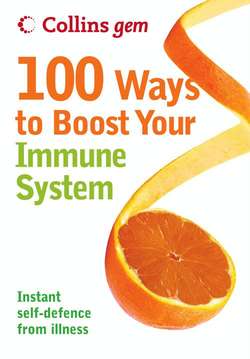Читать книгу 100 Ways to Boost Your Immune System - Theresa Cheung, Theresa Cheung - Страница 20
Immunity enemies
ОглавлениеAlthough compromised immunity can be triggered by accidents and medication (or in rare cases, immuno-deficiency disease viruses such as HIV), the most common causes of below-par immunity are in fact related to diet and lifestyle choices. In other words, the strength of your immune system is strongly influenced by factors within your control.
A healthy immune system forms the basis of your well-being, so making it more efficient by avoiding anything that might compromise or weaken it is fundamental to good health. Listed below are factors that clinical experience and modern research have shown to have the most damaging influence on immunity, and which should be avoided to ensure good health.
Nutritional deficiencies: The immune system works best when you keep it supplied with a full range of micronutrients such as vitamins and minerals. A poor diet increases the likelihood of nutritional deficiencies and therefore weakens immunity. (For advice on optimising your immunity through diet choices, see ‘Part Two: Boosting immunity with nutrition’.)
Stress: Chronic stress causes the adrenal glands to secrete higher levels of corticosteroids, which depress immune function. (For advice on boosting your immunity through stress management, see ‘Part Two: Boosting immunity with lifestyle changes’.)
Depression: Research shows that people who are negative, moody, nervous and easily stressed have a weaker immune response than those who are more positive. (For advice on boosting your immunity with a positive attitude, see ‘Part Two: Boosting immunity with a Fighting spirit’.)
Lack of quality sleep: Lack of sleep seems to impair the healthy functioning of the immune system. (For advice on getting a good night’s sleep, see ‘Part Two, pages 92–93’.)
Sedentary lifestyle: Exercise enhances the overall functioning of the immune system, and protects against heart disease, cancer and osteoporosis, as well as being an effective way to relieve stress. Research has shown that people who exercise regularly are less likely to get colds than those who are not active. (For advice on immune boosting and exercise, see ‘Part Two, pages 94–95’.)
Over-exertion: Too much exercise can be as damaging as too little. Over-exertion suppresses T-cell function and other immune responses. (For advice on boosting immunity with a regular, moderate exercise plan, see ‘Part Two, pages 94–101’.)
Weight gain: Obesity increases the risk of cancer and heart disease, so maintaining a healthy body weight is a sensible way to encourage long-term immune health, as well as general well-being. (For advice on boosting immunity through weight management, see ‘Part Two, pages 102–103’.)
Alcohol, cigarettes and drugs: Alcohol in excess, together with smoking and taking recreational drugs are simply not compatible with a healthy immune system. The odd drink now and again is fine, but more than one drink a day depresses the immune system; drug use is a major cause of poor nutrition, which damages immunity further; and cigarette smoke contains high levels of dangerous chemicals, including cadmium, which is a powerful immune system depressant. (For advice on quitting smoking, see ‘Part Two, page 126’.)
Over-use of antibiotics: Over-use of antibiotics can cause unintentional suppression of normal immune system responses. (For advice on the sensible use of antibiotics, see ‘Part Three: Fighting Infection’.)
Environmental pollutants: All of the following three categories can compromise immunity and although it is impossible to avoid them completely, sensible use and taking the recommended precautions are advised.
Radiation: From mobile phones, televisions, microwaves, radio transmitters and computers.
Chemicals: From engine exhaust fumes, pesticides, herbicides, smoke, aerosols, paints and household products such as air fresheners, cosmetics, deoderants, detergents and furniture polish. Food additives, preservatives and colourings also fall into this category.
Biological: From house dust, dust mites and mould.
(For advice on avoiding environmental pollutants that can compromise immunity, see ‘Part Two, pages 146-167’.)
